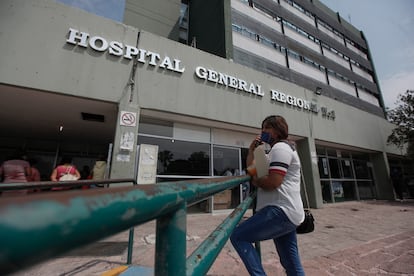Medical negligence in Mexico: Woman has legs amputated after erroneous diagnosis
The National Human Rights Commission wants the victim to receive economic compensation for the ordeal that she went through in the state of Querétaro in 2018

This Wednesday, Mexico’s National Human Rights Commission (CNDH) has asked the general director of the Mexican Institute of Social Security (IMSS), Zoé Robledo Aburto, the “immediate repair of the damage, including the payment of sufficient economic compensation” to a woman who went to an IMSS hospital in the state of Querétaro in 2018 due to abdominal pain. The patient received a misdiagnosis. Her health condition quickly became serious, requiring the removal of her uterus and an ovary and, later, the amputation of both legs.
The CNDH addressed Robledo Aburto directly in a public recommendation. Its report observes that medical personnel at the Regional General Hospital number 1 in Querétaro “violated rights to the protection of health, to personal integrity and to sexual and reproductive health and damaged the life of a 27-year-old woman due to inadequate diagnosis, treatment and medical follow-up of a translocated Intra-Uterine Device (IUD), which generated a generalized infection that led to cardiac arrest.”
As reported by the Commission, sufficient evidence exists to demonstrate that the care received by the woman was not timely or adequate. The authorities identified the Family Unit as responsible for issuing a diagnosis without clinical lab studies, X-rays or ultrasounds, and without taking into account the IUD removal procedure that had been performed.
According to the CNDH’s reconstruction of the events, in September 2018, a 27-year-old woman went to the IMSS Family Medical Unit at least three times for abdominal pain. She was diagnosed with a urinary tract infection and colitis, and the medical staff treated her without requesting laboratory studies. Subsequently, the patient went to the obstetric-gynecological area of the hospital for the removal of an IUD that was in an abnormal position. Three days later, the woman returned to the Family Unit, where, again, without prior analysis, she was diagnosed with acute low back pain.
As the patient’s conditions worsened, she was transferred from the emergency room to the hospital, where she was admitted due to “severe blood loss, infectious gastroenteritis and severe dehydration.” By that point, she needed mechanical ventilation, intubation and a blood transfusion. She also suffered a cardiac arrest and required resuscitation for 30 minutes. The uterus and an ovary were removed, and, subsequently, given the seriousness of her health condition, both legs had to be amputated.
“The CNDH considers that the victim’s life prognosis is serious, due to the complications derived from inadequate medical care that left her with permanent damage in her ambulatory function, by amputating both lower extremities and forcing her to use prostheses. It is noted that, although the amputation of limbs was carried out to save the life of the victim in the face of the infection, the procedure was the result of inadequate medical care, a poor and incomplete diagnosis and inadequate follow-up, allowing the advance of the preventable infection,” says the Commission.
In addition to financial compensation to the victim and her family, the Commission has requested that the IMSS provide the woman with psychological and psychiatric care and access to medical services for life, as she now requires care as a result of her permanent disability.
Medical negligence is an ongoing issue in Mexico. On July 1, the CNDH made another recommendation to the IMSS after the complaint of a woman in San Luis Potosí who in 2017 received a wrong diagnosis of cancer and was told that she would die in six months. For five years, she received aggressive treatment for a tumor that turned out not to be cancerous.
Tu suscripción se está usando en otro dispositivo
¿Quieres añadir otro usuario a tu suscripción?
Si continúas leyendo en este dispositivo, no se podrá leer en el otro.
FlechaTu suscripción se está usando en otro dispositivo y solo puedes acceder a EL PAÍS desde un dispositivo a la vez.
Si quieres compartir tu cuenta, cambia tu suscripción a la modalidad Premium, así podrás añadir otro usuario. Cada uno accederá con su propia cuenta de email, lo que os permitirá personalizar vuestra experiencia en EL PAÍS.
¿Tienes una suscripción de empresa? Accede aquí para contratar más cuentas.
En el caso de no saber quién está usando tu cuenta, te recomendamos cambiar tu contraseña aquí.
Si decides continuar compartiendo tu cuenta, este mensaje se mostrará en tu dispositivo y en el de la otra persona que está usando tu cuenta de forma indefinida, afectando a tu experiencia de lectura. Puedes consultar aquí los términos y condiciones de la suscripción digital.









































